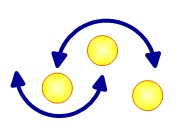Preferences for Obtaining and Processing Information
Processing Information
The Active-Reflective scale determines how you prefer for processing information.
Active learners learn by doing something with information. They prefer to process information by talking about it and trying it out.
Reflective learners learn by thinking about information. They prefer to think things through and understand things before acting. An active learner would say, “let’s try it!” A reflective learner would say, “let’s think about it first.”
Take in Information
The Sensing-Intuitive scale determines how you prefer to take in information.
Sensing learners prefer to take in information that is concrete and practical. They are oriented towards details, facts, and figures, and prefer to use proven procedures.
Intuitive learners prefer to take in information that is abstract, original, and oriented towards theory. They look at the big picture and try to grasp overall patterns.
Presentation of Information
The Visual-Verbal scale determines how you prefer information to be presented.
Visual learners prefer visual presentations of material – e.g. charts, diagrams, graphs, and pictures.
Verbal learners prefer explanations with words, both written and spoken.
Organizing Information
The Sequential-Global scale determines how you prefer to organize information.
Sequential learners prefer to organize information in a linear, orderly fashion.
Global learners prefer to organize information more holistically and in a seemingly random manner.

